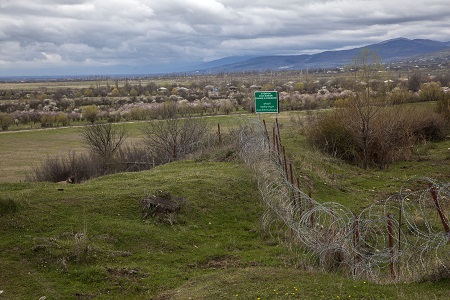Georgia condemns Russia’s ‘border deal’ with de facto Tskhinvali

Georgia strongly condemns the recent ratification of an agreement between Russia and Georgia’s breakaway Tskhinvali (South Ossetia) region to establish and mark the state border around the occupied territory.
Yesterday parliament of de facto Tskhinvali (South Ossetia) ratified the Treaty on the State Border with Russia at its second reading. The document, signed Russia and the de facto regime in Moscow on February 18, 2015, was "a core document defining the line of the Russian-South Ossetian state border”, Russian media reported.
Today Georgia publically condemned the treaty, and said Tskhinvali (South Ossetia) was an integral part of Georgia, not an independent state.
The deal envisaged marking a state border around the occupied territory to clearly distinguish the area as a separate state from Georgia.
Georgia’s Ministry of Foreign Affairs released a special statement that said Georgia’ strongly condemned the deal, its recent ratification and the notion as a whole that occupied Tskhinvali was an independent state.
Earlier Russian and Tskhinvali news agencies said the deal contained a detailed description of the state border between the Republic of South Ossetia and Russia that ran along the Caucasus Mountain range from West to East.
Russian news agency Tass reported the total length of the South Ossetian state border was about 440km. The Russian-Ossetian section was 74km long while the remaining 366km was its border with Georgia.
Murat Dzhioyev, the South Ossetian president’s special envoy for the post-war settlement, told Tass that a map depicting the state border, which used to exist in the former USSR, was attached to the bill as a supplement.
Russian president Vladimir Putin signed a bill on the state border between Russia and Tskhinvali into law on April 26, reported Tass.
In today’s statement Georgia’s Foreign Ministry said the agreement had no legal power as it contradicted all international rules and regulations, and could only be discussed as a part of Russia’s occupation policy. The Ministry said through such deals Russia tried to "mask” and "legalise” its occupation of two Georgian regions, Abkhazia and Tskhinvali, after the Russia-Georgia war of 2008.
In this context the Georgian agency highlighted the cooperation treaties between Russia and Georgias’ two de facto regions, as well as recent claims Tskhinvali will hold a referendum whether to join Russia or not.
The Ministry stressed Russia continued to violate the ceasefire agreement it signed with Georgia on August 12, 2008 following the brief but bloody war, and appealed to the international community to "appropriately evaluate” Russia’s occupation actions.
We address the international community to relevantly assess Russia’s continued steps against Georgia’s sovereignty and territorial integrity for Russia to meet the ceasefire deal and de-occupy Georgia,” wrote the Ministry in its statement.
The Georgian side also emphasised the importance of an international security mechanism that would ensure safe and peaceful return of all Internally Displaced People (IDPs) to the regions.
 Tweet
Tweet  Share
Share